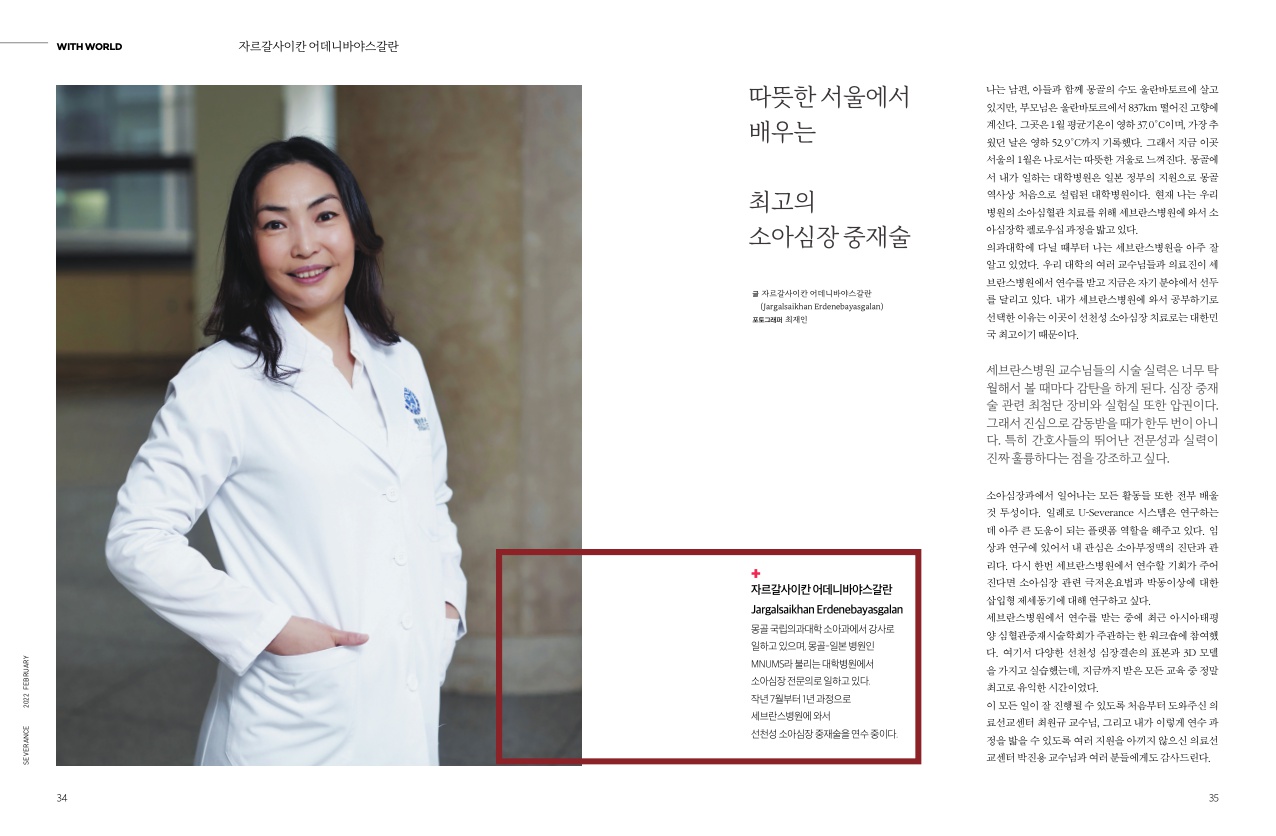Activities & News
News & Events
[International Office] Interview with Dr. Erdenebayasgalan
- Views 866
- Writer Office of International Relations
- Date 22.07.13

1) Please introduce yourself.
My name is Jargalsaikhan Erdenebayasgalan. It is easily called Baysa. I am 36 years old. I live with my husband and my son in the capital city, Ulaanbaatar of Mongolia. My husband's name is Erdenesaikhan. We met 17 years ago when we were students. My son's name is Tenuunsaikhan, and he is 13 years old. My father’s name is Jargalsaikhan and my mother’s name is Tserendorj. My parents are over 60 years old and live in our hometown. My hometown Tosontsengel sum of Zavkhan province is located far 837 kilometers from the capital city. Interestingly, my hometown is the coldest area in Mongolia. The average temperature in January is −37.0 °C, and temperatures as high as −52.9 °C have been recorded.
2) Where is your working place back in your country and what is your specialty?
I work as a lecturer at the Department of Pediatrics of Mongolian National University of Medical Sciences, and also I work as a pediatric cardiologist at the University hospital that is named Mongolia-Japan Hospital of MNUMS. The university hospital has been established by the support of Japanese Government for the first time in history of Mongolia. Therefore, I am studying as a pediatric cardiology fellowship at Severance Hospital to provide and initiate advanced pediatric cardiovascular care in our brand-new hospital.
3) How did you get to know Severance? Why did you choose Severance as your training hospital?
Yonsei University has been being supporting our university for many years. I have known about Yonsei University and Severance hospital since I was a young medical student. Many professors and doctors of our university studied at Severance hospital, and they are leading in their field. I chose Severance hospital because the congenital and pediatric cardiology center at Severance hospital is the best in Korea.
4) How long is your training period in Korea?
My training period will last one year, from 2021.7.01 to 2022.6.30.
5) Which area did you focus on during your fellowship at Severance?
My main goal at Severance Hospital is to study interventional procedures for pediatric congenital heart disease.
6) What is the most impressive feature of Severance Hospital?
I am very impressed with the professors' great skills, high-tech equipment, and catheter laboratories at Severance Hospital. I also would like to emphasize the nurses’ excellent performance and professionalism.
7) What are the specific contents of your fellowship program at Severance?
All the activities of our pediatric cardiology department are important lessons for me. I think that the u-Severance system is a very helpful platform for studying.
8) What was your first impression of Korea?
The public transportation system is well-developed. The buses and subway are very comfortable and clean.
9) What is the best memory so far during your stay here?
I recently participated in a congenital pathology workshop organized by Asia-Pacific Cardiovascular Intervention and Surgery. During this workshop, I practiced specimens and 3D models of various congenital heart defects. I have never participated in such beneficial training before.
10) Who are you most thankful for at Severance (who helped you the most) & why?
I extremely appreciate Professor Paul Wonkyu Choi at the Medical Mission Center. He initially received my request. Also, Professor Chin Yong Pak and other people from the Medical Mission Center supported my everything coming here.
11) If you were to get the chance to come back, which field of clinical study would you like to focus on?
My further clinical and academic interest is pediatric arrhythmias’ diagnosis and management. If I am given the opportunity, I would like to study pediatric cardiac cryoablation therapy and implantable cardioverter defibrillators for heart rhythm abnormalities in children.
12) Do you have any special experience related to COVID-19? What are your thoughts and feelings about the way Korea is dealing with COVID-19, and what is the situation like in your home country?
Before coming to Korea, I closely contacted several COVID-19 patients when I worked at a routine OPD. However, I was not infected because I regularly maintained infection prevention. This shows us that the infection may not spread if everyone wears a mask and maintains a good infection regimen. In Korea, everyone wears quality protective masks (N80, N94) that are made in Korea anywhere.
"If file name is long, file name can be cut due to browser characteristics."

